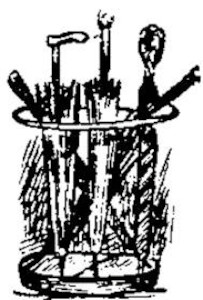This article has been transcribed from a copy of the Cardiff Times in the online collection of scanned Welsh newspapers 1804-1919 in the National Library of Wales, with grateful recognition of the free access accorded to all readers. W. M. Thackeray created the decorative initial for Vanity Fair.
Explanatory Notes
Bank Holidays, although introduced by an act of 1871, were still sufficiently new in 1891 for the newspaper's compositor to be uncertain as to whether the two words should be hyphenated or not. In the present article, for example, there are over twice as many hyphenated as unhyphenated instances (irrespective of grammatical function). Examples in OED show care taken before 1900 to hyphenate when the term is used adjectively, but not otherwise. Since 1950 the hyphen seems to have been dropped in all cases. This article notes the emergence of some modern ways of holidaying, including nature rambling.
When Samuel writes that bank holidays are 'a boon and a blessing' to working people, he is using the language of advertising, and quoting doggerel from a prominent advertisement in Edinburgh: 'They came as a boon and a blessing to men, / The Pickwick, the Owl, and the Waverley pen'. Macniven and Cameron Ltd. of Edinburgh, later known as Waverley Cameron Ltd., advertised their pen-knibs with this doggerel, and their advertisement over the entrance to Waverley Station in Edinburgh ensured its international celebrity until the last quarter of the twentieth century. For other uses of this quotation, see also 'Samuel on Hats and Their Wearers'; 'Samuel on Domestic Nuisances'; and 'Samuel on "Socials"'
Sir John Lubbock M P (1834-1913), partner in the London bank Robarts, Lubbock & Co, was the prime mover in the Bank Holiday Act of 1871. He is referred to in this article as ‘Saint Lubbock’ not only because of his popularity as a benefactor of the working population but also because, in the past, holidays (or holy days) were referred to by the name of the saint celebrated on that day. Samuel’s rhetorical device implies that Bank Holidays will be enshrined for ever. Before the Reformation every day had a saintly eponym for everyday use, such as 'Crispin Crispian' in Shakespeare’s Henry V. It happens that this article was published on what is a public holiday in some traditionally Catholic countries, such as France, being the Feast of the Assumption, a feast-day of course unrecognised in Protestant Wales.
'Arry and 'Arriet are, of course, used as typical names for working class Londoners. —— David Skilton

ank-Holidays are popularly supposed to be the special days when ''Arry' and '‘Arriet' go out for a genuine frisk with no reservations, and with no intention of missing anything that comes within reach of their Bank-Holiday purse.
The aristocracy have no respect for St. Lubbock's day, and they would as soon think of inviting '‘Arry and 'Ariet'' to tea as joining in the frivolities and pleasures in which they take so keen a delight.

Enjoys Bank Holidays
Yet Bank-Holidays are a boon and a blessing to thousands of working-men and women in many stations of life. These people look forward to the breaks in their monotonous lives which Bank-Holidays furnish, with a pleasure that their more cultured fellows know nothing of, and which, if they dared, they would give any amount of money to be able to indulge in.
The principal objection urged against Bank-Holiday patrons by the superior ones of the earth is that they take their pleasures in such an uproarious manner as to become a nuisance to their more sober-minded fellows. These people will tell you that '’Arry and 'Arriet' make day hideous with their shouting and laughter, and that they are but little removed from the uncivilised savage.
If by any accident duty compels these too superfine people to be in the same spot with a set of Bank-Holiday 'trippers,' they walk and move about as though they were afraid of being contaminated by their presence. They seem to imagine that ''Arry and ‘Arriet' have no rights to enjoy themselves in their own way, but should be content to toil and slave year in and year out in habitations where brightness and sunshine a[re] conspicuous by their absence.
What narrow-minded cant all this is.

Hates Bank-Holidays
If these people who imagine that the pleasant spots of the earth were made for their especial benefit only would only take off the veil of prig[r]ishness they wear so perpetually, they would be able to feel a new pleasure — the pleasure of bringing some small meed of enjoyment into the monotonous lives of people to whom Bank-Holidays are festivals to be observed with full honours.
It is all very well for people [who]to take their holidays just when the fancy seizes them to expect other people to do the same. To many people the taking of a holiday is so dependent on circumstances that they can never be certain until close upon the time when they will be able to take their annual holiday.
Therefore they are only too glad to avail themselves of such holidays as come to them in the ordinary course of commercial events.

Popular on Bank-Holidays
Many there are who enjoy their Bank Holidays in quite a different fashion to that in vogue with ''Arry and 'Arriet.'
These are the people who take things leisurely and peacefully. They prefer walking to riding, and if they are but favoured with fine weather they may be relied upon to get a full meed of pleasure for an expenditure that is almost infinitesimal.
Nature is the strong point of these peace-loving holiday-makers, and it is interesting and surprising to note how much enjoyment they can obtain from a solitary walk down a country lane, or a ramble over the moors where nature is at her best, and where the wild flowers are striving to impress upon the passing pedestrian the fact that they are as lovely and as wonderful as their cultured and more fragile sisters of the greenhouse and the garden.

Unpopular on Bank-Holidays
From any point of view Bank-Holidays are things to be thankful for, and it will be an ill-day when Saint Lubbock has to tell us that they are a thing of the past. Let each set of holiday-makers enjoy themselves in their own way; and if the less cultured prefer Ramsgate and the Isle of Man to Cromer or the Lakes, why there are still left plenty of places for those whose Bohemia's Land lies in a different direction.
For my own poor part I am glad of a holiday that gives me an opportunity of getting away from the perpetual grind of the treadmill of life, and take particular care that I do not waste it, whether it be a Bank holiday or any other kind of respite.
Links to Related Material
- Samuel on Summer Holidays
- Sir John Lubbock, M.P., F. R. S (Punch’s Fancy Portraits)
- Victorian Leisure Activities
- The Seaside in the Victorian Literary Imagination
- Seaside Resorts
- The Mistake of Going on Holiday: Travel, Tourism and Leisure in Early and Mid-Victorian Illustration
Last modified 30 April 2022